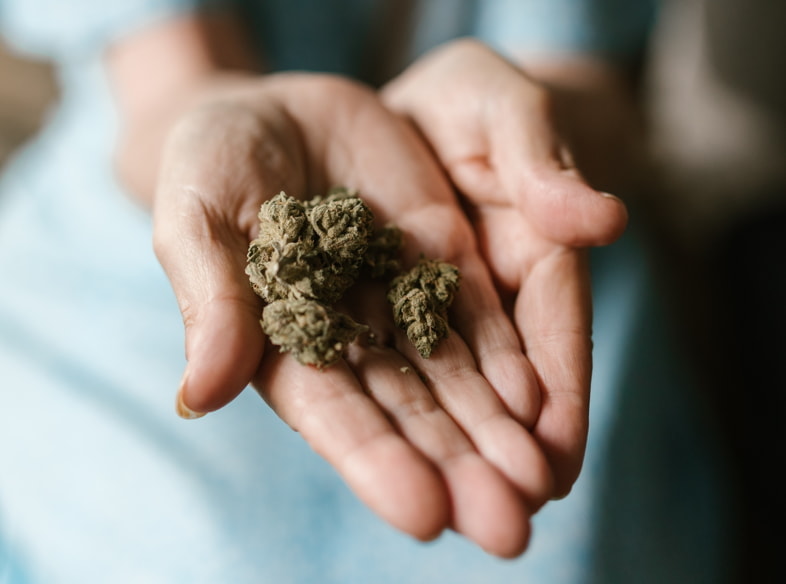Modified on: 02/01/2024
HOW DOES SMOKING MARIJUANA AFFECT TESTOSTERONE LEVELS?
Let’s look at what testosterone is and how taking cannabis or hashish interacts with its production, and the main processes it regulates.
What is testosterone?
Testosterone is the male hormone par excellence, as it is responsible for typically masculine traits, such as a beard and a big voice.
It has many different functions in the body, but in this article, we will only look at the main ones, particularly those directly related to sexuality.
In addition to the fundamental role this hormone plays in the development and growth of the individual at all stages, from foetus to adulthood, testosterone is responsible for regulating sexual desire, erection and its maintenance, and sexual satisfaction. Not only that, it ensures fertility and regulates sperm production in terms of quality and quantity.
But let’s now look at how cannabis consumption can interact with these essential functions.


Cannabis and sexual activity
There are essentially two ways cannabis can be a powerful ally for sexual activity.
The greatest enemy of satisfactory sexuality is undoubtedly the dreaded erectile dysfunction for men and women.
This term refers to the inability to achieve a penile erection or the difficulty in maintaining it long enough to complete intercourse.
Although it is not yet discussed too openly, this problem affects more people than we think, and its causes can be various.
First of all, the so-called performance anxiety is a problem caused by two factors, one internal to the subject experiencing it and one linked to the environment in which the subject lives and the consequences that this has on him.
In the first case, anxiety is triggered by psychological causes: fear of not being up to scratch or of being judged, for example.
The well-known anxiolytic properties of CBD may be an essential ally in curbing this problem, as they act by relaxing the mind and thus favouring a more carefree and consequently more satisfying performance.
Secondly, the cause could be related to a hormonal imbalance, often resulting from the environment in which one lives or is raised.
There are pathological forms of erectile dysfunction generated by the negative effects of pollution on testosterone production.
Men produce much less testosterone than in the past due to substances such as oestrogen and dioxin, which are contained in extremely high levels in the food we eat. These substances appear to have a negative effect on testosterone production, and not only that. The number of spermatozoa is also affected and is significantly reduced.
Even in this situation, cannabis can prevent the accumulation of these toxic substances in the fatty tissue and promote their expulsion.
Read also: Marijuana museums in Europe
Effects of marijuana on sexual life
Marijuana appears to improve the sex life of its users.
According to science, it seems that taking cannabinoids (in the form of CBD flower, e.g.) in limited quantities helps people approach sex in a more relaxed and casual way.
According to American sex therapist Lawrence Siegel, THC acts on brain receptors linked to sexual pleasure and arousal, activating them.
Another function of tetrahydrocannabinol that should not be underestimated, particularly in this case, is disinhibiting, which is extremely important as it enables sexual activity to be engaged more freely and spontaneously. Cannabis also helps to reduce performance anxiety and heightens sensitivity.


How marijuana use can affect on male reproductive system?
Marijuana use has become a prevalent topic of discussion in recent years, and its potential impact on the male reproductive system has garnered attention from researchers and healthcare professionals alike. Numerous studies have investigated the relationship between marijuana use and various aspects of male reproductive health, including testosterone levels and overall fertility.
One significant area of concern is the effect of marijuana use on testosterone production. Research suggests that marijuana may influence the endocrine system, leading to changes in the production and regulation of hormones such as testosterone. Chronic marijuana use has been associated with alterations in serum testosterone levels, with some studies indicating a potential decrease in total testosterone in concentrations.
The endocannabinoid system, which plays a crucial role in regulating physiological processes, has been implicated in mediating the effects of marijuana on male reproductive hormones. The interaction between marijuana and the endocannabinoid system can impact luteinizing hormone (LH) and follicle-stimulating hormone (FSH), both of which are essential for testosterone production. Changes in these hormones may contribute to reduced adult testosterone in individuals who engage in frequent marijuana use.
Furthermore, concerns extend to the potential impact of marijuana on male fertility. Studies suggest that chronic marijuana use may be linked to alterations in sperm count and quality. Such changes could have implications for reproductive health, with potential consequences for couples attempting to conceive.
Apart from hormonal influences, marijuana use has been associated with lifestyle factors that can affect reproductive health. Smoking marijuana, often intertwined with other substances like tobacco, is recognized as a potential contributor to adverse effects on the male reproductive system. Additionally, the coexistence of drug and alcohol dependence may further compound these issues, emphasizing the importance of considering a comprehensive approach to reproductive health and substance use.
While some studies have suggested a negative correlation between marijuana use and testosterone levels, it is essential to acknowledge that the relationship is complex and may vary among individuals. The existing body of research underscores the need for more comprehensive studies to better understand the nuanced effects of marijuana on male reproductive health.
In conclusion, marijuana use has been associated with potential alterations in testosterone levels and male reproductive health. However, further research is needed to establish conclusive evidence and to better understand the intricacies of this relationship. As the landscape of marijuana use evolves, it becomes increasingly important to consider the broader implications for male reproductive health and to promote informed decision-making regarding substance use.
Chronic marijuana use in general
Chronic marijuana use has been a subject of increasing concern, particularly in relation to its potential impact on the male reproductive health and hormone levels. Numerous studies have delved into the association between chronic marijuana use and low testosterone* production, shedding light on the intricate interplay within the endocrine system.
One notable effect observed in chronic marijuana users is the alteration of testosterone levels. Research indicates that chronic intensive marihuana use may lead to lowered plasma testosterone levels, in male subjects. This reduction in serum testosterone levels is attributed to the influence of marijuana on hormone production, particularly affecting Leydig cells in the testes.
The endocannabinoid system, where cannabinoid receptors are prevalent, plays a crucial role in mediating the effects of marijuana on hormone regulation. Chronic marijuana use has been linked to changes in luteinizing hormone (LH) and follicle-stimulating hormone (FSH), further influencing testosterone concentrations. Such changes may potentially contribute to reduced adult testosterone in chronic marijuana users.
Studies have also explored the potential impact of marijuana use on male fertility, with concerns raised about sperm count and semen quality. Chronic marihuana smoking has been associated with detrimental effects on the male reproductive health, encompassing issues such as testicular dysgenesis syndrome and an increased risk of testicular cancer.
Additionally, lifestyle factors, including smoking weed drug alcohol, and environmental influences, can contribute to estrogen dominance and negatively affect male reproductive health. The potential for chronic marijuana use to affect testosterone levels has implications for reproductive health and fertility.
While more research is needed to comprehensively understand the relationship between chronic marijuana use and testosterone, existing studies highlight the importance of considering these factors. It is crucial to recognize that the effects of marijuana on testosterone levels may vary among individuals, and other variables such as body mass index, drug and alcohol dependence, and infectious diseases can further complicate the overall impact.
In conclusion, chronic marijuana use appears to exert an influence on the male reproductive health and testosterone levels. Understanding these effects is essential for individuals, healthcare professionals, and policymakers alike, emphasizing the need for further research to explore the nuanced connections between marijuana use, increased testosterone concentrations, and overall reproductive health.
The voice outside the choir
Among the multitude of favourable opinions on the consequences that cannabis use can have on the body, and in particular positive effect on the sexuality of those who use it, the opinion of Dr Andrea Militello, Italy’s best urologist andrologist of 2018, stands out.
According to the doctor, although marijuana indeed enhances sexual activity from a fundamental emotional point of view, it is equally valid that the situation changes considerably when observed from a clinical perspective.
According to Dr Militello, cannabis abuse “can cause erectile dysfunction and male infertility“.
Concerning studies on male sexual function in relation to marijuana use, the collected data offer a sometimes contradictory overview, but what emerges quite clearly is that “marijuana may improve the subjective experience of sexual intercourse, while potentially contributing to erectile dysfunction in a dose-dependent manner, i.e., increasing in relation to the amount taken”.
No mention was made of the risks related to the intake of cannabis sporadically and in small amounts.
Read also: Hemp seeds, their properties and uses in the kitchen
So does smoking lower testosterone?
The relationship between smoking and testosterone levels has been a subject of research, with studies exploring the potential impact of smoking, including smoking weed, on testosterone production.
Smoking weed has been associated with changes in testosterone levels, particularly in chronic users. Several studies have suggested a potential negative correlation, indicating that chronic marijuana consumption may lead to lower testosterone levels in certain individuals.
The mechanism through which smoking, specifically smoking weed, affects testosterone levels involves interactions with the endocrine system. Chronic use of marijuana, containing cannabinoids that interact with the endocannabinoid system, can influence hormonal regulation. Cannabis use may affect the pituitary gland and disrupt the normal functioning of hormones such as luteinizing hormone (LH) and follicle-stimulating hormone (FSH), subsequently impacting testosterone production.
Lower testosterone levels, in turn, have implications for male fertility and testicular function. Studies have explored potential links between chronic marijuana use and issues such as male infertility, altered sperm count, and quality. These findings underscore the importance of understanding the broader effects of marijuana consumption on reproductive health.
While existing studies suggest a potential negative impact of smoking weed on testosterone levels, it is crucial to note that research in this area is still evolving. Factors such as environmental factors, individual differences among marijuana smokers, and the potential influence of other substances may contribute to variations in study outcomes. Additionally, some studies indicate the need for more comprehensive research to fully grasp the complex relationship between marijuana use and testosterone levels.
In conclusion, the available evidence suggests that smoking weed may be associated with lower testosterone levels, potentially impacting male reproductive health. However, more research is required to establish definitive conclusions, considering the intricate interplay of various factors and the need for a more nuanced understanding of the effects of marijuana use on the testosterone level.
In conclusion
As is often the case, science provides us with different scenarios on the same issue.
In this case, to sum up, it is pretty clear that the use of medical marijuana can provide a more than valid solution to specific problems, such as performance anxiety, if we consider the short-term effects. Still, at the same time, it is not without more than undesirable side effects if it is abused in the long term.
Don’t miss our content and visit our online store Justbob to choose between legal cannabis, hashish and CBD oil.
We are waiting for you in our cannabis CBD shop!









